Andrew Strathern received his Ph.D from Cambridge University and is an internationally recognized scholar and social anthropologist with a wide range of interests, including the analysis of political and economic systems, kinship theories, social change, religion and ritual, symbolism, ethnicity, legal anthropology, conflict and violence, the anthropology of the body, and the cross-cultural study of medical systems.
He has carried out long-term fieldwork in the Pacific (especially Papua New Guinea), Asia (especially Taiwan), and Europe (with a focus on Ireland and Scotland) and continues an active research and publication program in these global arenas as well as others. He also conducts research in and teaches on contemporary anthropological theory, linguistic anthropology, and linguistic and social issues in Europe and globally.
For many years he has collaborated with Dr. Pamela J.Stewart pamjan@pitt.edu and they have published widely on their findings. They are frequently invited international lecturers, discussing their current theoretical perspectives. Several of Strathern and Stewart’s recently published books are “Peace-Making and the Imagination” (Strathern and Stewart, 2011); “Ritual: Key Concepts in Religion” (Stewart and Strathern, 2014); and “Working in the Field: Anthropological Experiences across the World” (Stewart and Strathern, 2014). Their research work in the Pacific, Asia, and Europe feeds into their Disaster Anthropology project on global climatic change, natural disasters, and human-produced disasters. They are experts in Ritual Studies; Peace and Conflict Studies; Healing and the Body; and they have developed the Pitt in the Pacific Program with the University of Pittsburgh’s Study Abroad Office. They work with Material Culture and conduct museum studies around the world.
Research Description
Andrew Strathern and Pamela J. Stewart are a husband and wife research team who have published over 50 books and hundreds of articles on their fieldwork. They have been conducting research (fieldwork and archival work) in Europe for over two decades, focusing on work in Scotland, Ireland, and on the European Union. Their work has included aspects of the study of Scots as a minority language and its Ulster-Scots variant within County Donegal, Republic of Ireland, and in Northern Ireland, and also cross-border relations between the Republic and Northern Ireland as well as issues of devolution within the United Kingdom. They have also been working on Scottish Diaspora Studies, relating to Western Australia, New Zealand, and the United States. A further dimension of their work relates to Heritage Studies in general and the contesting contexts in which the idea of heritage is deployed. They are the co-editors of the "European Anthropology" Series. They have also published many books and articles on their fieldwork in Papua New Guinea, Taiwan, Ireland and Scotland.
They are the Co-editors of Journal of Ritual Studies (also see the Journal's Facebook Page!), the Ritual Studies Monograph Series and the Ethnographic Studies in Medical Anthropology and the European Anthropology Series with Carolina Academic Press. They Co-Edit the Series Anthropology and Cultural History in Asia and the Indo-Pacific for Routledge Publishing and the Series The Palgrave Studies in Disaster Anthropology for Palgrave Publishing. More about Research can be found on our Personal Website
Personhood in Melanesia

Arrow talk (el ik) is a genre of political oratory among the Melpa-speaking people of Mount Hagen in the Western Highlands Province of Papua New Guinea. It is practiced at the end of political events to express how history has crystallized into a state of transactional play between participants in the exchanges that constitute the event, including the sense of the event as a transition between other events and any suggestions of contradictions involved in these transactions.
Strathern, Andrew and Pamela J. Stewart
2000 Arrow Talk: Transaction, Transition, and Contradiction in New Guinea Highlands History. Kent State University Press, p.1.
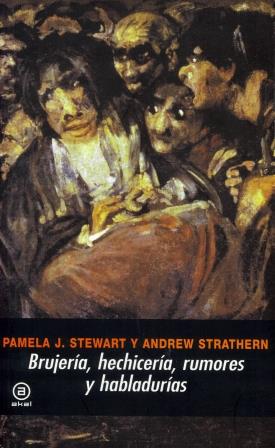
A whole genre of vampire films designed for viewing by people in Europe and America taps into the same concerns as are exhibited in African contexts today. In general, these phenomena force us to recognize the final demise of the myth that modernity is based on the "triumph of rationality" in human affairs. Witchcraft ideas are themselves rational if we view them as logics of explanation. At the same time, they draw their power from fantasies of guilt and desire that arise from sources that could be labeled as "irrational."
Stewart, Pamela J. and Andrew Strathern
2003 Witchcraft, Sorcery, Rumors and Gossip. Cambridge University Press, pp. 91-2.
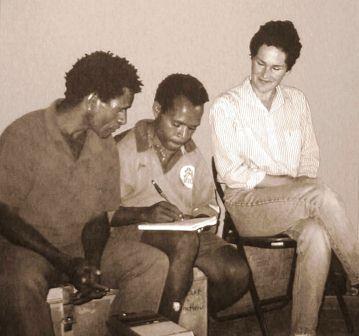
Each narrator tends to have an overall way of achieving a presentation of self corresponding to what Caroline Barros (1998) has called the "autobiographical persona." Like personhood, persona is the overall self-characterization that the narrator is attempting to project through the narrative process.
Stewart, Pamela J. and Andrew Strathern
2000 Introduction. In Identity Work: Constructing Pacific Lives,edited by Pamela J. Stewart and Andrew Strathern. University of Pittsburgh Press, p. 5.
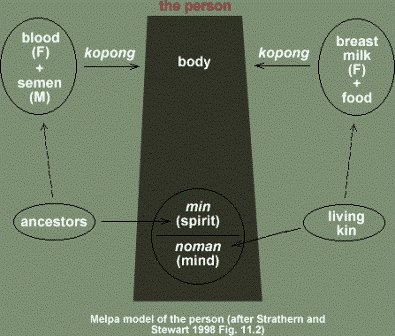
The min (spirit) comes directly from the ancestors, entering into the body during gestation, while noman (mind) develops after birth through the socializing influences of kin and primarily through the ability to speak. The person is therefore a complex amalgam of substances and influence.
Strathern, Andrew and Pamela J. Stewart
1998 Melpa and Nuer ideas of life and death: the rebirth of a comparison. In Bodies and Persons: Comparative Perspectives from Africa and Melanesia, edited by M. Lambek and A. Strathern, Cambridge University, p. 236.
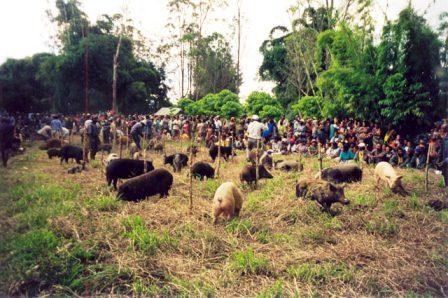
Pigs lined up and tethered to stakes for a compensation payment, Mount Hagen, Papua New Guinea, 1998. The occasion brought people from two different language groups together, since a killing had taken place between the Hagen and the Enga peoples, threatening the peace in the town of Mount Hagen itself, where immigrants from Enga live along with Hageners.
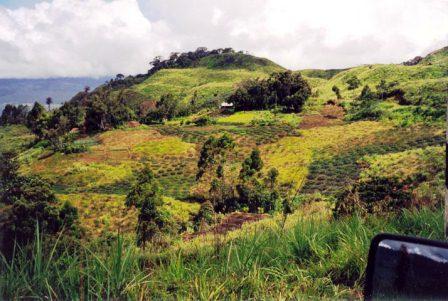
Round sweet potato beds in gardens at high altitude on the south road from Mt. Hagen to Tambul, Papua New Guinea, 1998. The sweet potato has been of prime importance in the social evolution of societies in the Highland region.
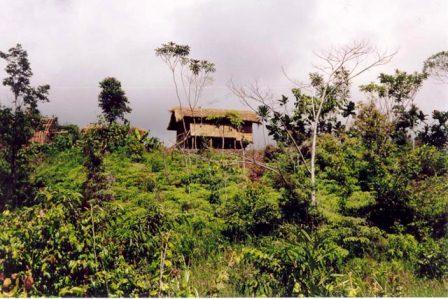
Large house built on stilts amid secondary regrowth in Hagu settlement among the Duna speakers of the Aluni Valley, Papua New Guinea, 1999. This house was being built for a young pastor of the Baptist church who is from the settlement, and its design reflects the status accorded to this new category of ritual leader.
Taiwan, Politics of Ritual
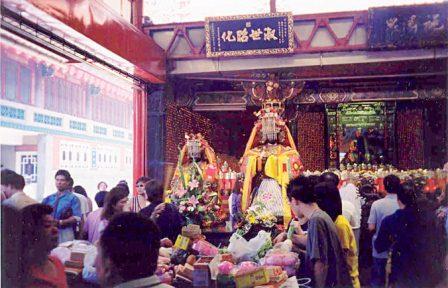
Two statues of the Deity Mazu sit in the midst of worshipers and tables covered with offerings to honor the Deity on the celebration of her birthday. Kuantu temple in Taipei, Taiwan, 2002.
In "the Mazu [Female Daoist Deity] complex in Taiwan...Mazu is seen as having great power over matters such as fertility and rain, and temples to her are ranked in terms of their putative founding dates and their consequent privileges of precedence in relation to one another...This relationship of precedence is marked by troupes of performers carrying statues of Mazu back to temples from which their own temple or its image originated, in order to renew their power and to show the performers' respect to the founding temples.
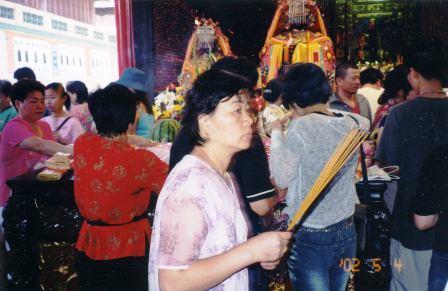
Worshiper burning incense at the Kuantu temple in Taipei, Taiwan on the celebration of Mazu's birth date.
Strathern, Andrew and Pamela J. Stewart
2003 Divisions of power: rituals in time and space among the Hagen and Duna peoples, Papua New Guinea. Taiwan Journal of Anthropology 1(1)51-76.
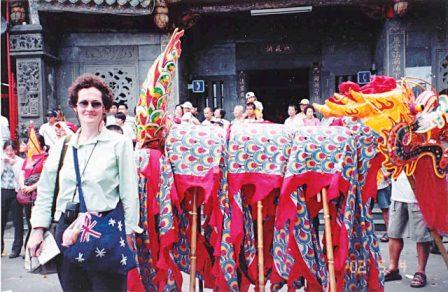
Dr. Pamela J. Stewart stands next to a resting dragon puppet that has just completed a dragon dance through the control of a local temple worship performance troupe. The location is the Kuantu temple, Taipei, Taiwan, 2002. The celebration was to mark the birthday of the Deity Mazu.
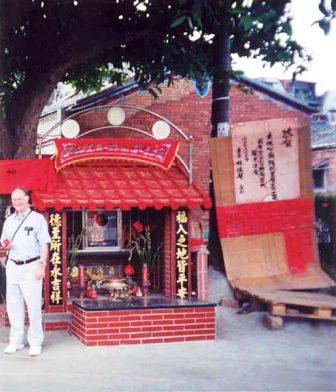
Prof. Andrew Strathern (A.W. Mellon Professor of Anthropology, U. of Pittsburgh) stands next to a newly constructed, privately funded, temple dedicated to the Earth God. He holds a fruit that a local worshiper shared with him after the worshiper prayed to the Deity at this temple, 2002. This temple is near to the Institute of Ethnology, where Prof. Strathern and Dr. Stewart are affiliated when they work in Taiwan. Through the Institute of Ethnology they are also studying aspects of historical change, cultural revival movements, and conversion to Christianity among the indigenous Austronesian speaking peoples of Taiwan with special reference to the Paiwan area.
Curing and Healing
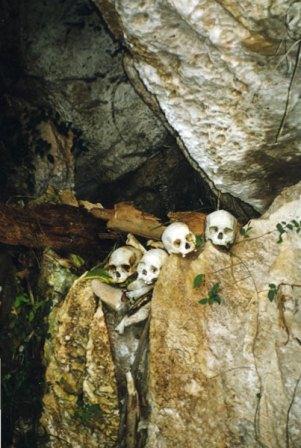
In the past, after a corpse had been exposed for the requisite number of days on a platform, the remains (bones) of the corpse would be removed and placed in a cave which would serve as the burial vault and permanent repository for them. This site was considered to be the home for the spirit, tini, of the dead person and had to be taken care of by the kin of the deceased.
Strathern, Andrew and Pamela Stewart
2010 (2nd ed.) Curing and Healing: Medical Anthropology in Global Perspective. Carolina Academic Press, p. 50.
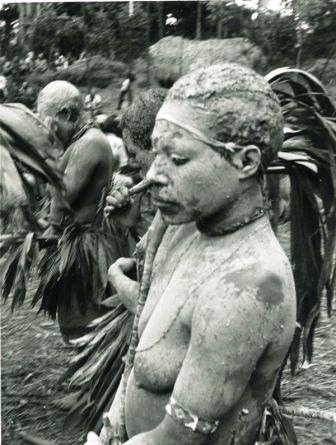
Female mourner among the Ndika people near Mount Hagen, early 1970s. Her hair, face, and body are plastered with white mourning clay, and she carries a cordyline switch. Earth paints are used to mark the body in particular ways (for healing, grief, or celebration, for example), and act to produce a kind of second skin on the person that intimately connects the human body to the ground.
Stewart, Pamela J. and Andrew Strathern, with contributions by Ien Courtens and Dianne van Oosterhout.
2001 Humors and Substances. Ideas of the Body in New Guinea. Bergin and Garvey, Westport.
Europe: Ethnicity, Language, and Identity
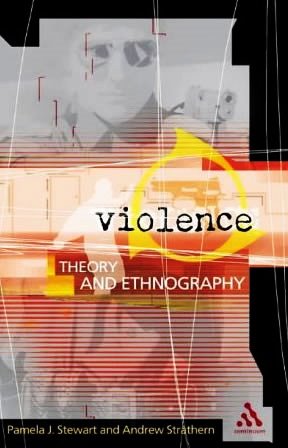
Violence: Theory and Ethnography explores the meanings and contexts in which violent actions occur. The authors develop further the concept of ‘the triangle of violence’ - the idea that violence is marked by the triangle between performers, victims, and witnesses – and the proposition that violence is also marked by contests regarding its legitimacy as a social act. Adopting an approach which looks at the negotiated and contingent nature of violent behavior, Pamela J. Stewart and Andrew Strathern stress the powerful unacknowledged associations between ideas of revenge and concepts of justice. These theoretical perspectives are applied to in-depth case studies from Rwanda-Urundi, Sri Lanka and Northern Ireland. The authors also draw on extensive field experience in Papua New Guinea, using ethnographic detail to address broader issues of considerable global importance.
Stewart, Pamela J. and Andrew Strathern
2002 Violence: Theory and Ethnography. New York and London: Continuum Publishing for Athlone Press.

Scots influence and traditions show clearly in these kilted and bagpipe playing marchers at the Orange Order parade, Rossnowlagh, south-west County Donegal, 5 July 2003. The Rossnowlagh marches are known for being peaceful. Near the center of this group one man holds up a huge Lambeg drum, which he is playing.
Strathern, Andrews, Pamela J. Stewart, and Neil Whitehead (eds.)
2006 Terror and Violence: Imagination and the Unimaginable. London and Ann Arbor: Pluto Press.
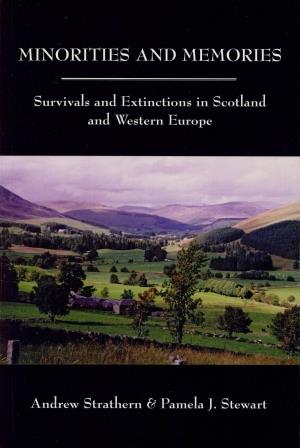
Minorities and Memories: Survivals and Extinctions in Scotland and Western Europe explores historical expressions of identity in Scotland, based on fieldwork in the Lowlands of Scotland carried out during 1996-2000, mostly in the County of Ayrshire but including materials from all over Scotland. Particular chapters consider Wales and Northern Ireland (where the authors have also conducted research subsequently as well as in County Donegal, Republic of Ireland) in comparison to Scotland. The book continuously weaves together historical narrative with anthropological reflections and analyses, examining the issue of identities through the perspective of both disciplines. The St. Andrew’s flag or Saltire is a mark of the longstanding sense of national identity in Scotland.
Strathern, Andrew and Pamela J. Stewart
2001 Minorities and Memories: Survivals and Extinctions in Scotland and Western Europe. Durham, N.C.: Carolina Academic Press.
Courses
Ritual: Theories and Cases
This course will examine the broad range of theories on the topic of ritual, an arena of discussion which has long been central to anthropological analysis and has acquired further significance through its overlaps with psychology, history, cognitive studies, and religious studies. The course will utilize selections from the extensive literature on the topic, both historical and contemporary, and will be enhanced by use of audio-visual materials for discussion. Students will be encouraged to bring forward their own themes for discussion throughout the course. The course will be open to students from Anthropology, Religious Studies, Cultural Studies, and related disciplines. This course will be offered on a regular basis in Spring Term.
Contemporary Anthropological Theory
In the last twenty five years, significant theoretical shifts have occurred within cultural anthropology, leading to and beyond the so-called post-modernist approaches. There was first a decline of encompassing "grand theories," followed by a stress on local forms of knowledge and practice as the object of our investigations. Later there have been a series of attempts at reconstructive theorizing either generally or in specific arenas, for example, in political anthropology and in historical anthropology. This course will explore medical anthropology, cognition and culture, the anthropology of religion, gender and modernity, ecology and development studies, globalization, political economy, and practice theory, including theories of violence and assist students critically to evaluate some of these trends. Attention will be paid to current issues of globalization and the creation or assertion of new forms of identity, local and transnational, in geopolitical contexts; as well as to reconstructive theories in general, for example in the sphere of religion and ritual, and studies of “development” and NGOs, environmental issues and disaster studies, and theories in the area of economic anthropology and neo-liberalism, as well as classic exchange theory and ecology. Prerequisites: This course is for 2nd or 3rd year Anthropology graduate students and others interested.
Linguistics Core Course
Language, evolution, and prehistory, world languages. Survey of phonology and phonemics, morphemics, syntax, writing systems and spelling, ethnosemantics, and sociolinguistics. Language and culture, language and power, the Sapir-Whorf hypothesis, ethnoscience, ethnography of communication, and linguistic pragmatics and meta-pragmatic approaches. Oral history and Oral genres, including poetry and song in Papua New Guinea and elsewhere. Language and movements for indigeneity and nationalism. Language studies and Cultural Anthropology including structuralism, the significance of literacy, cognition and culture, kinship studies, Pidgins and Creoles, Lallans and Ulster-Scots, the politics of minority languages.
Medical Anthropology 2
This course offers a survey of selected topics in contemporary medical anthropology. Topics to be covered may include cross-cultural and biocultural approaches to the study of sickness and healing, critical approaches to the study of biomedicine, interpretive approaches to ethnomedical systems, meaning-centered approaches to understanding the experience of suffering and pain, and the social construction of illness and healing. Special topics investigated include the anthropology of the body and sexuality, and physician-patient communication. Other topics can be added in accordance with student interests.
Human Ecology
This course examines human ecological relations within the environment, paying special attention to the vital contemporary issues surrounding global climate change and its specific manifestations in local ethnographic cases, the vulnerability and precarity that is implicated by it, and in particular how environmental disasters are increasingly being generated and test the resilience and creativity of the populations that experience them, including all life-forms and the landscapes they create and depend on for their life processes.
Kinship and the Family
Kinship in all its historical and contemporary manifestations is a central and enduring topic in the social sciences, ranging from the formal studies of different kinship systems to the intersection of changing gender relations and the construction of ideas of personhood and identity in the post-industrial world. Kinship ties run through all arenas of human life, including politics, economics, and religion, and are vital to the processes of cultural transmission and radical changes in cultural adaptations.
Myth, Symbol and Ritual
Mythology and its symbolism and ritual enactments are vital parts of the lives of many peoples and enter into the struggles of indigenous populations around the world as they seek to recreate the relationship with the environment. Myth remains an important part of religious practices. In addition, myth appears in changing guises in the creation of national and transnational identities in contemporary global society, and mythical sensibilities rest on the human capacity to create and deploy symbols. This course covers and provides insights into the aesthetics and the generative capacity of symbols and how they emerge into mythological and ritual syndromes.
Pacific Cultures
Pacific cultures present us with a fascinating picture of variability and adaptive variation in different parts of the vast area of Oceania. Taking into account long-term patterns of change from archaeological records and the work of comparative linguists, and utilizing a rich range of materials from media sources, this course provides a unique conspectus of insights, drawing on long-term field research, and aims to portray also the charm of these vibrant cultures and their contemporary struggles with problems of modernization and ecological challenges.